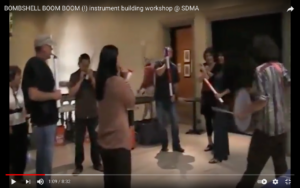On his UU Growth blog, Peter Bowden provides a link to a couple of interesting essays on “Faith Formation in 2020” on the “Lifelong Faith” Web site, with links to one essay on “Thirteen Trends and Forces Influencing the Future of Faith Formation in a Changing Church and World,” and to another essay on “Four Scenarios for the Future of Faith Formation in 2020.” I’ve done a preliminary reading of these two articles, and while I have my doubts about some of the material I also found plenty to think about.
In the “Thirteen Trends” essay, some of the usual trends are mentioned — the drift away from organized religion in the U.S., the increasing diversity in the U.S. population, the growing willingness to identify young adulthood as a separate developmental stage, etc. It’s nice to see all these trends collected together in one place, but mostly I didn’t see anything really new. However, the section on “The Rise of a Distinctive Post-Boomer Faith and Spirituality” was quite good, drawing on research by Robert Wuthnow, and work by Richard Flory and Donald E. Miller. Flory and Miller define “four emerging forms of the post-Boomer spiritual quest”:
Innovators are those who represent a constantly evolving, or innovating, approach to religious and spiritual beliefs and practices. Many of these are newer, less established groups that are affiliated with the “emerging church” movement, while others are established churches and ministries that are innovating within their own traditions. Innovators demonstrate a desire for embracing the emerging postmodern culture, and within that context are engaging in a spiritual quest that by definition is one that must change and adapt — innovate — to meet the changing culture currents.
Appropriators refer to those churches and ministries that seek to provide a compelling and “relevant” experience for participants, both for those in the audience and for those who are performing in the service or event. In this, both churches and independent ministries seek to create these experiences through imitating, or appropriating, trends found in the larger culture and ultimately popularizing these through their networks into a particular form of pop-Christianity primarily oriented toward an individual spiritual experience.
Resisters refer to what are primarily Boomer-initiated efforts intended to appeal to Post-Boomers by focusing on the “recovery of reason” and resisting postmodern culture within Christianity. They hoping to reestablish the place of the written text and rational belief as the dominant source for Post-Boomer spirituality and practice.
Reclaimers are seeking to renew their experiences of Christianity through the history, symbolism and practices of ancient forms of the faith, such as those still found in the liturgical traditions, thus reclaiming the ancient symbols, rituals and practices of these traditions for their own spiritual quest. Reclaimers demonstrate a quest that takes them on a journey to ancient Christian traditions in small, family-oriented congregations through which they pursue their desire for spiritual development.
Obviously, this has been written for a Christian audience. But you can find these four trends within Unitarian Universalism:–
There are a few Innovators within Unitarian Universalism, though they mostly get forced out of the mainstream of our methodologically and liturgically conservative congregations. We have a few Appropriators within Unitarian Universalism, although most of them are trying to appropriate white middle class Boomer culture (e.g., the new hymnal supplement), which means that they really don’t represent post-Boomer spirituality. There are a few Reclaimers, who often meet in smaller groups for worship and service — UU neo-pagan groups meeting for rituals, UU Christian groups meeting for lectio divina or communion, UU Jewish groups, etc. There are also the Resisters — Post-Boomers who are being encouraged by older humanists to adopt an agenda of strong rationalism, with a heavy reliance on written texts (not scriptures, mind you, but rational texts), as opposed to visual arts, music, movement, etc.
The question is whether or not we Unitarian Universalists have really engaged with post-Boomer spirituality at all. What do you think? Outside of the Sunday school and youth group, is your Unitarian Universalist congregation engaging with post-Boomer spiritualities in any significant way?


